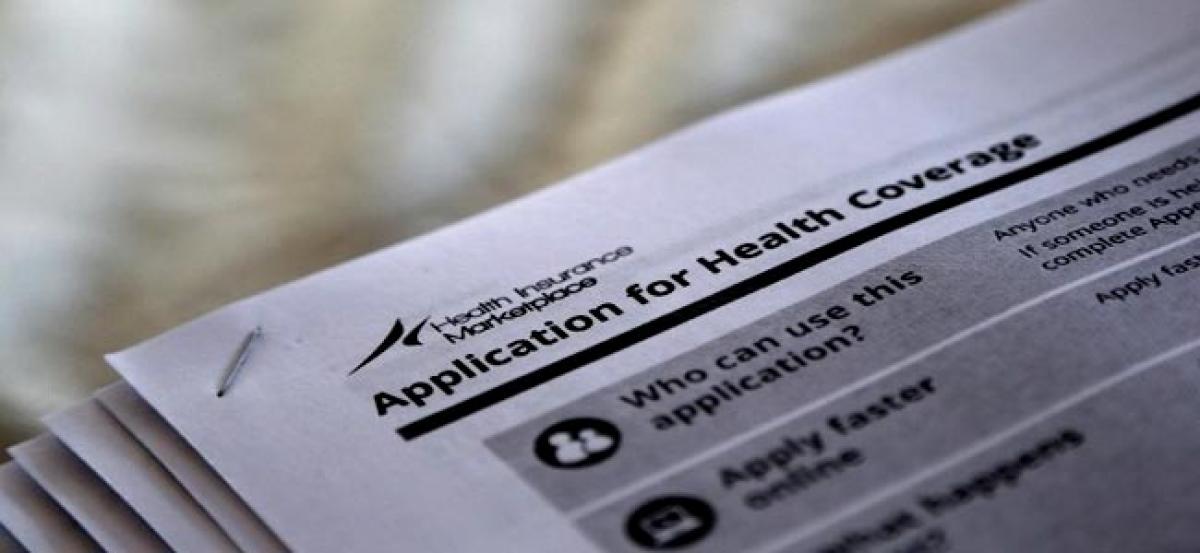Live
- Over 7,600 Syrians return from Turkiye in five days after Assad's downfall: minister
- Delhi BJP leaders stay overnight in 1,194 slum clusters
- Keerthy Suresh and Anthony Thattil Tie the Knot in a Christian Ceremony
- AAP, BJP making false promises to slum dwellers for votes: Delhi Congress
- 'Vere Level Office' Review: A Refreshing Take on Corporate Life with Humor and Heart
- Libya's oil company declares force majeure at key refinery following clashes
- Illegal Rohingyas: BJP seeks Assembly session to implement NRC in Delhi
- Philippines orders full evacuation amid possible volcanic re-eruption
- Government Prioritizes Welfare of the Poor, says Dola Sri Bala Veeranjaneyaswamy
- Two Russian oil tankers with 29 on board damaged due to bad weather
Just In

US House Republicans are working on changes to their healthcare overhaul bill to provide more generous tax credits for older Americans and to add a work requirement for the Medicaid program for the poor, US House Speaker Paul Ryan said on Sunday.
US House Republicans are working on changes to their healthcare overhaul bill to provide more generous tax credits for older Americans and to add a work requirement for the Medicaid program for the poor, US House Speaker Paul Ryan said on Sunday.
Ryan said Republican leaders still plan to bring the healthcare bill to a vote on the House of Representatives floor on Thursday. Speaking on the Fox News Sunday television program, he added that leaders were working to address concerns that had been raised by rank-and-file Republicans to the legislation.
"We think we should be offering even more assistance than the bill currently does," for lower-income people age 50 to 64, Ryan said of the tax credits for health insurance that are proposed in the legislation.
Ryan also said Republicans are working on changes that would allow federal block grants to states for Medicaid.
Republicans remain deeply divided over their US healthcare overhaul, which is President Donald Trump's first major legislative initiative and aims to fulfil his campaign pledge to repeal and replace Obamacare, the healthcare program of his Democratic predecessor Barack Obama.
Trump has been wooing lawmakers to vote for the bill. He won the backing of a dozen conservative lawmakers on Friday after an Oval Office meeting in which the president endorsed a work requirement and block-grant option for Medicaid.
But there are still holdouts. Even as Ryan said he felt "very good" about the health bill's prospects in the House, a leading conservative lawmaker told the C-Span Newsmakers program that there were currently 40 Republican "no" votes in the House. Republicans hold a majority in the chamber but cannot afford to have more than 21 defections for the measure to pass.
Representative Mark Meadows, the chairman of the hardline conservative House Freedom Caucus, said the bill would "absolutely not" pass the way it is now.
Meadows, a North Carolina Republican, also said the changes being considered for the Medicaid program would not go far enough, if they left it up to states to decide whether to put in place a work requirement.
An optional work requirement for Medicaid would be "a step backwards, not a step forwards," Meadows said in an appearance on C-Span's Newsmakers. Even if the healthcare bill were to pass the House, it also would face significant challenges in the Senate.
Senator Tom Cotton, a conservative Arkansas Republican who has been a critic of the legislation, said that the problem with the legislation was that it would not reduce premiums for people on the private insurance market. Lawmakers need to slow down and solve this problem, he said. "It's fixable, but it's going to take a lot of work," Cotton said on CNN's "State of the Union."
Moderate Republicans have also expressed concerns about the bill, and their worries are often not the same as conservatives'.
Speaking on NBC's Meet the Press, Republican Senator Susan Collins of Maine said she was concerned about the impact of the proposal on older Americans. She also worried the bill would shift Medicaid costs to states -- something critics say a block-grant approach would only make worse.
Collins said coverage issues must also be dealt with, citing a report from the Congressional Budget Office that said 14 million people would lose health coverage under the House bill over the next year and 24 million over the next decade.

© 2024 Hyderabad Media House Limited/The Hans India. All rights reserved. Powered by hocalwire.com







